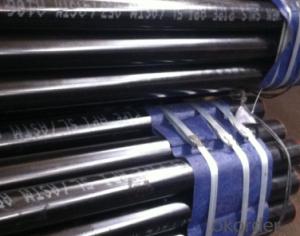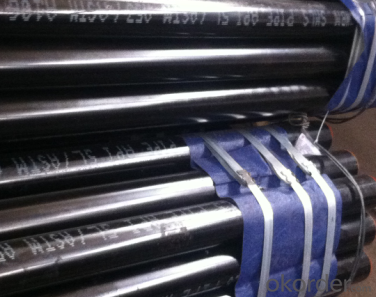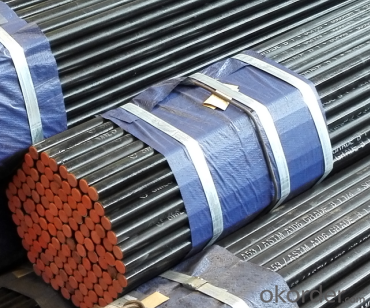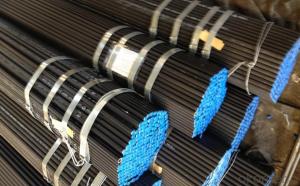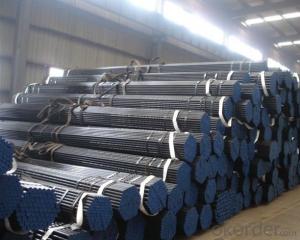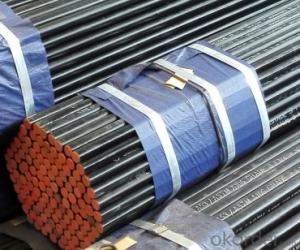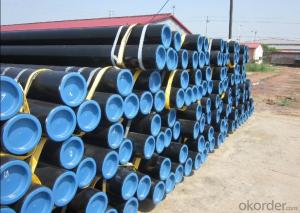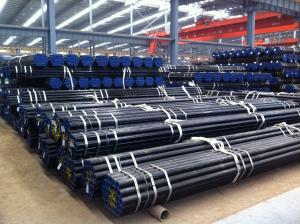CS Seamless Steel Pipe ASTM A53/ ASTM A106/ API
- Loading Port:
- China main port
- Payment Terms:
- TT OR LC
- Min Order Qty:
- 25 m.t.
- Supply Capability:
- 2500 m.t./month
OKorder Service Pledge
OKorder Financial Service
You Might Also Like
Product Description - CS SEAMLESS PIPE ASTM A53/ ASTM A106/ API 5L GR B:
Structure:
Seamless pipe is formed by drawing a solid billet over a piercing rod to create the hollow shell.
As the manufacturing process does not include any welding, seamless pipes are perceived to be stronger and more reliable.
Historically seamless pipe was regarded as withstanding pressure better than other types, and was often more easily available than welded pipe.
Main Features:
• High manufacturing accuracy
• High strength
• Small inertia resistance
• Strong heat dissipation ability
• Good visual effect
• Reasonable price
Specifications:
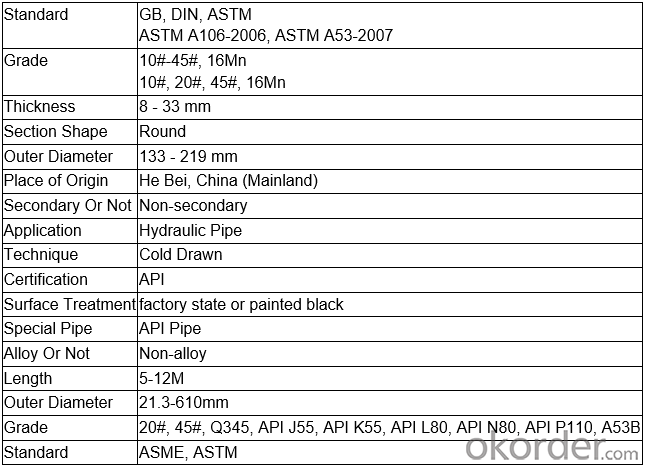
1) Material:20#(ASTM A 106/A53 GRB.API5LGRB,GB),45#,16Mn,10#.
2) Specification range:OD:21.3-610mm,WT:6-70mm,length:6-12m or according to the requirement of clients.
3) Excutive standards:GB,ASME API5L.ASTM A 106/A53,Despite of the above standards,we can also supply seamless steel pipe with standard of DIN,JIS,and so on,and also develop new products according to the requirements of our clients!
4) Surface:black lacquered,varnish coating or galvanized.
5) Ends:Beveled or square cut,plastic capped,painted.
6) Packing:bundles wrapped with strong steel strip,seaworthy packing.
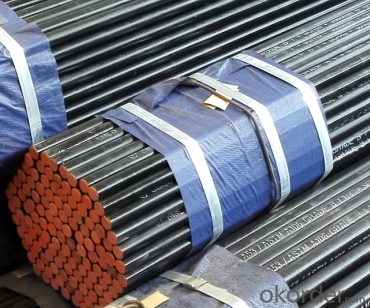
- Q: What is the role of steel pipes in the construction of stadiums?
- Steel pipes play a crucial role in the construction of stadiums as they are used for various purposes such as structural support, framing, and the creation of plumbing and drainage systems. These pipes provide the necessary strength and durability required to withstand heavy loads, ensuring the overall stability and safety of the stadium structure. Additionally, steel pipes are also used for the installation of HVAC systems, electrical wiring, and other infrastructure components, making them an essential element in the construction process.
- Q: Can steel pipes be bent or curved?
- Yes, steel pipes can be bent or curved using specialized machinery and techniques such as cold bending, induction bending, or hot bending.
- Q: How are steel pipes coated for insulation purposes?
- Steel pipes are commonly coated for insulation purposes through a process called external coating. This involves applying a layer of insulating material, such as polyethylene or epoxy, onto the surface of the steel pipe. The coating is carefully applied to ensure a uniform and continuous layer, which helps to prevent heat transfer and protect the pipe from corrosion.
- Q: What are the different types of joints used with steel pipes?
- Steel pipes commonly use several types of joints, depending on the specific application and requirements. Some of the most frequently used types are as follows: 1. Butt Joint: This type of joint is the most basic, involving the alignment and welding of two pipes at their ends. It creates a strong and continuous connection, but reinforcement may be necessary depending on the pipe's size and pressure rating. 2. Socket Weld Joint: Smaller diameter pipes often utilize this joint, where one pipe is inserted into the socket of another and then welded together. It provides good strength and resistance against leaks. 3. Threaded Joint: A threaded joint involves screwing together two pipes with threaded ends. It is commonly used in low-pressure applications and necessitates the use of pipe threads and sealants for a tight and leak-free connection. 4. Flanged Joint: In high-pressure applications, a flanged joint connects two pipes by bolting together flanges at their ends. This type of joint allows for easy disconnection and maintenance. 5. Grooved Joint: A grooved coupling is placed around the ends of two pipes in a grooved joint, which is then secured with bolts. This joint is commonly used in fire protection systems due to its quick installation and easy maintenance. 6. Welded Joint: A welded joint involves fusing two pipes together using various welding techniques like GTAW or GMAW. It provides a strong and permanent connection but requires skilled labor and additional equipment. Each type of joint has its own advantages and limitations, and the selection depends on factors such as pipe size, pressure rating, application, and installation requirements. Choosing the appropriate joint is crucial to ensure the integrity and reliability of the steel pipe system.
- Q: What are the different methods of joining steel pipes for high-pressure applications?
- Some of the different methods of joining steel pipes for high-pressure applications include welding, threaded connections, flanged connections, and mechanical couplings. Welding involves fusing the pipes together using heat, making it a strong and permanent connection. Threaded connections involve screwing the pipes together using threads on the ends, which can be easily assembled and disassembled. Flanged connections involve using flanges and bolts to connect the pipes, providing a secure and leak-proof connection. Mechanical couplings use mechanical devices such as clamps or compression fittings to join the pipes, allowing for quick and easy installation and removal.
- Q: Are steel pipes suitable for underground irrigation pumping?
- Indeed, steel pipes prove to be a fitting option for underground irrigation pumping. Renowned for their robustness and resilience, steel pipes present themselves as an optimal selection for subterranean utilities. They boast the capacity to endure substantial pressure, ward off corrosion, and remain less susceptible to soil shifting or fluctuations in temperature. Moreover, steel pipes exhibit a lengthier lifespan when juxtaposed with alternative materials, thereby mitigating the necessity for frequent replacements. However, it remains imperative to guarantee meticulous coating or lining of the steel pipes to avert corrosion and to consistently examine and uphold them for their continued efficacy and durability.
- Q: What are the different types of connections used with steel pipes?
- There are several types of connections commonly used with steel pipes, including threaded connections, welded connections, flanged connections, and grooved connections.
- Q: What are the environmental impacts of steel pipe production and disposal?
- The production and disposal of steel pipes have significant environmental impacts. Firstly, the production of steel pipes requires the extraction of raw materials such as iron ore, coal, and limestone. This extraction process leads to habitat destruction, deforestation, and soil erosion. Additionally, mining and processing these materials require a considerable amount of energy, often derived from fossil fuels, contributing to greenhouse gas emissions and air pollution. The manufacturing process itself involves various stages, including melting, casting, rolling, and coating, all of which require substantial energy inputs and emit significant amounts of carbon dioxide and other greenhouse gases. Moreover, the production of steel pipes involves the use of chemicals and additives that can be harmful to the environment if not managed properly. Furthermore, during the disposal of steel pipes, if not recycled or properly managed, they can end up in landfills, contributing to waste accumulation and taking up valuable space. Steel is generally non-biodegradable and can take hundreds of years to decompose. When steel pipes are dumped in landfills, they can release toxic substances and heavy metals, which can contaminate soil and groundwater. However, it is important to note that steel pipes are highly recyclable, and recycling them significantly reduces the environmental impact. Recycling steel pipes helps conserve natural resources, reduces energy consumption, and lowers greenhouse gas emissions. Additionally, using recycled steel in the production of new pipes requires less energy and results in fewer emissions compared to using virgin materials. To minimize the environmental impacts of steel pipe production and disposal, it is crucial to promote sustainable practices throughout the entire lifecycle of the product. This includes reducing energy consumption, utilizing renewable energy sources, implementing proper waste management strategies, and encouraging the recycling and reuse of steel pipes.
- Q: DN150 welded steel tubes one meter multiple
- Calculated theoretical weight (Kg) per inch of welded steel pipe = (outside diameter wall thickness) * wall thickness * 0.02466DN150 welded pipe, "150" means nominal diameter of 150mm. Its outer diameter is 165mm.
- Q: How are steel pipes used in the construction industry?
- Steel pipes are extensively used in the construction industry for a wide range of applications. They are primarily used for transporting various fluids and gases, such as water, oil, and natural gas, throughout the construction site or building. Steel pipes are also commonly used as structural elements in the construction of buildings, bridges, and tunnels, providing strength and stability to the structures. Additionally, steel pipes are utilized in the construction of plumbing systems, HVAC (heating, ventilation, and air conditioning) systems, and fire protection systems.
Send your message to us
CS Seamless Steel Pipe ASTM A53/ ASTM A106/ API
- Loading Port:
- China main port
- Payment Terms:
- TT OR LC
- Min Order Qty:
- 25 m.t.
- Supply Capability:
- 2500 m.t./month
OKorder Service Pledge
OKorder Financial Service
Similar products
Hot products
Hot Searches
Related keywords
